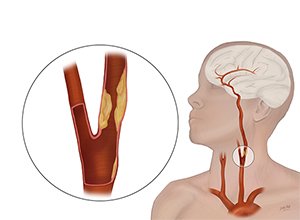
TransCarotid Artery Revascularization (TCAR)
Firelands Health is offers a breakthrough technology called TransCarotid Artery Revascularization (TCAR) to treat patients with carotid artery disease who are at risk for open surgery. While any repair of the carotid artery carries some risk of causing a stroke because of the repair itself, TCAR was designed to help minimize that risk by keeping potential stroke-causing fragments away from the brain.
Like the open surgery, carotid endarterectomy (CEA), this innovative procedure involves direct access to the carotid artery but through a much smaller incision at the neckline just above the clavicle instead of a longer incision on the neck. During the TCAR procedure, a tube inserted into the carotid artery is connected to a system that temporarily directs blood flow away from the brain to protect against dangerous debris from reaching the brain during the procedure. Surgeons then filter the blood before returning it to a vein in the groin, and a stent is implanted directly into the carotid artery to stabilize the plaque and prevent future strokes. The entire procedure is performed in less than half the time of CEA – limiting the stress on the heart and significantly cutting the risk of the patient having a stroke or heart attack during the procedure.
Patients who undergo the TCAR procedure recover quickly (typically spending just one night in the hospital) and almost always go home the next day to return to full and productive lives with less pain, smaller scars, and a reduced risk of future strokes.
Your physician may recommend the TCAR procedure if you’ve been diagnosed with carotid artery disease and are not a suitable candidate for CEA. This may depend on your age or other existing medical conditions. For more information about TCAR, call us to schedule a consultation with one of our vascular surgeons.
Carotid artery disease

Carotid artery disease is a form of atherosclerosis or a build-up of plaque in one or both of the main arteries of the neck. The carotid arteries are vital as they feed oxygen-rich blood to the brain. When plaque builds up in the carotid arteries, they begin to narrow and slow down blood flow, potentially causing a stroke if blood flow stops or plaque fragments travel to the brain.
Stroke
Every year, 15 million people worldwide suffer a stroke, also known as a brain attack. Nearly 6 million die and another 5 million are left permanently disabled. Carotid artery disease is estimated to be the source of stroke in up to a third of cases, with 427,000 new diagnoses of the disease made every year in the United States alone. To read about the signs of stroke, please visit our stroke blog.
Diagnosis
Carotid artery disease is typically silent and does not present with symptoms. Physicians can screen patients based on risk factors like high blood pressure, diabetes, obesity, and smoking. Sometimes, patients are screened for carotid artery disease if the doctor knows the patient has vascular disease elsewhere in the body. Blockages can also be found when a physician hears a sound through a stethoscope placed on the neck. The sound is caused by blood flowing past the blockage.
If someone is having stroke-like symptoms (weakness/numbness on one side, loss of eyesight/speech, garbled speech, dizziness, or fainting), they should seek immediate medical attention and be evaluated for carotid artery disease.
The following tests may be performed if carotid artery disease is suspected:
- Carotid artery ultrasound: This test uses sound waves that produce an image of the carotid arteries on a TV screen, and can be helpful in identifying narrowing in the carotid arteries. This test is painless and does not require the use of needles, dye, or X-rays.
- Angiography: An angiogram uses X-rays to take a picture of the carotid artery. In order for the X-ray to “see” the arteries, a dye is injected through a small tube (catheter) inserted into an artery in the groin or arm. This procedure will determine exactly where the narrowing is located and will help to guide further treatments.
